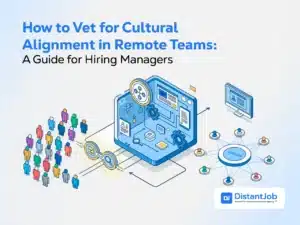Successfully recruiting top-tier offshore Java developers requires a strategic and meticulous approach that goes beyond traditional hiring methods. As global remote recruitment specialists, we’ve refined this process into actionable steps designed to secure the perfect Java talent for your team.
Follow this expert guide to make sure you hire an offshore Java developer who not only possesses the required technical mastery but also seamlessly integrates into your company culture and drives your projects forward.
What are the Advantages of Hiring Offshore Java Developers
Hiring offshore Java developers allows small companies and startups to access a global talent pool. Cost savings represent a significant benefit. On average, offshore developers are 40-60% less expensive than their counterparts in developed countries.
Quality does not suffer despite lower costs; countries such as Serbia and Romania are known to have developers with high proficiency levels in Java. They have proven their good reputation with their strong rankings in international coding competitions.
Small companies and startups gain a competitive edge with offshore Java developers due to lower operational costs and access to a broader talent pool. Offshore developers exhibit high adaptability, quickly aligning with project goals and company culture, a necessary trait for fast-paced startup environments. Financially, hiring an offshore Java developer makes perfect sense!
9 Essential Steps to Hire a Top Offshore Java Developer
When hiring a Java developer offshore, you want to check for:
1. Define Precise Java Skills & Expertise Requirements
An offshore Java developer should have a robust understanding of Java fundamentals, including object-oriented programming, which is non-negotiable. As seasoned experts in Java talent acquisition, we emphasize the absolute necessity of a crystal-clear technical brief.
Go beyond just “Java.” Specify core Java fundamentals (JVM, OOP principles, concurrency models), desired frameworks (Spring Boot, Hibernate, Apache Kafka, Microservices architectures), and related technologies (Docker, Kubernetes, cloud platforms like AWS/Azure/GCP). Highlight if full-stack capabilities are needed, including front-end technologies like Angular or React.js that often integrate with Java backends. This granular detail is crucial for targeting the exact offshore Java developer you need for your project.
Java developers with extensive experience in frameworks demonstrate superior problem-solving skills when tackling back-end challenges compared to those without. Mastery of development tools not only sharpens their efficiency but also fosters innovation in project execution. Those proficient in both Java and front-end technologies offer broader solutions, making them more valuable assets to their teams than counterparts focusing solely on back-end or front-end.
2. Prioritize Relevant Experience Levels & Project Impact
Our extensive data on successful placements consistently shows a direct correlation between experience and project success. Developers with extensive experience, often measured in years or completed projects, tend to deliver higher-quality work.
They offer not just coding skills but also problem-solving capabilities. These developers have worked on diverse projects, ranging from simple applications to complex enterprise systems. Their exposure to various industries, such as finance, healthcare, and e-commerce, equips them with a unique perspective on how to approach different challenges. A survey revealed that projects led by knowledgeable developers are 30% more likely to meet their deadlines and budget constraints than those led by novices.
While all experience levels have their place, for complex or critical projects, prioritize senior Java developers (5+ years experience) who are 75% less likely to introduce critical errors. Evaluate their experience not just in years, but in the types of Java development projects they’ve tackled (e.g., enterprise applications, high-traffic systems, greenfield projects) and their specific contributions. Request detailed portfolios and testimonials to verify their impact.
3. Assess English Language Proficiency for Seamless Collaboration
Effective communication is the bedrock of successful remote teams. We consider clear English proficiency a non-negotiable for offshore Java developers.
Ensure your candidates can articulate complex technical concepts, understand nuances, and engage proactively in discussions.
Beyond standardized tests (TOEFL, IELTS), conduct practical evaluations during interviews, focusing on their ability to explain past Java projects, discuss technical challenges, and ask insightful questions. This ensures smooth daily collaboration.
Developers with superior language skills often exhibit greater adaptability and learning capacity than those with limited proficiency. They navigate new tools, frameworks, and methodologies with relative ease, shortening the learning curve for emerging technologies.
4. Evaluate Cultural Fit for Team Cohesion & Retention
Our “culture-first” recruitment philosophy is proven to significantly boost team cohesion, productivity, and long-term retention rates for offshore Java developers. Ensuring cultural compatibility boosts team cohesion and productivity. According to a Deloitte study, companies that prioritize cultural fit see a 30% increase in team collaboration and a 19% rise in job satisfaction rates, as employees work harmoniously, respecting diverse work ethics and communication styles.
Look for candidates who share your values. Find someone who has the right personality traits, like adaptability, communication skills, assertiveness, the will to work remotely, and independence. That individual will be more satisfied with the position. That individual will stick around much longer, which is critical for a dedicated remote Java operation.
5. Strategically Manage Availability & Time Zone Differences
Successfully bridging geographical divides is a hallmark of effective offshore hiring. Time zone differences can significantly affect project communication and deadlines.
Don’t let time zones be a barrier. Find overlapping hours for when you do need to work synchronously (such as doing a scrum or even some meetings) and where both sides agree to some flexibility. If you have multiple international people, switch the meeting time around, or use tools to communicate asynchronously.

Establishing overlapping work hours is a practical solution. For instance, if a team in New York (UTC-5) hires a developer from New Delhi (UTC+5.5), ensuring a 2-3 hour overlap in their work schedules can facilitate real-time communication. This practice has been shown to enhance productivity by fostering better collaboration and reducing the turnaround time for queries and project updates.
6. Conduct In-Depth Review of Past Java Projects & Portfolios
Examination of past projects and portfolio reveals the developer’s competency, creativity, and experience in handling diverse projects.A candidate’s portfolio is the strongest evidence of their practical Java development skills.
Meticulously examine portfolios for examples of Java applications, contributions to open-source Java projects, and involvement in projects from conceptualization to deployment. Look for direct experience with the Java frameworks and libraries relevant to your needs. This provides insight into their competency, creativity, and real-world problem-solving abilities.
7. Communication and Collaboration Tools
Effective remote collaboration hinges on the right technology stack. Tools such as instant messaging applications and project management software streamline workflows. They minimize delays, misunderstandings, and errors. They also act a communication history, which acts as an additional source of information and project specification.
Which specific tools are important? Developers familiar with a range of tools, including code repositories, task trackers, and document-sharing platforms, contribute more effectively to different phases of a project. For instance, expertise in both GitHub for code sharing and Trello for task management improves developers’ ability to handle tasks efficiently.
Offshore Java coders with experience in popular tools have an edge over inexperienced developers. Their proficiency ensures information is accurately shared and tasks are synchronized across time zones. Such a behavioral structure leads to smoother project execution and higher-quality outputs, which benefits clients aiming for timely and successful project completions.
8. Hiring and Onboarding Process
A structured and efficient hiring process is key to securing top offshore Java talent quickly, followed by smooth integration.
Define a precise process. Understand specific requirements for your project and your ideal Java offshore employee. Conduct a professional interview process that covers all angles: technological, behavioral, and cultural. Once you have the right Java candidate, apply a complete onboarding process that explains everything to the developer, from setting up the technical environment to meeting the team (which should be a big part of your onboarding process).
To understand the project and company goals, learn about the company’s cultural environment, get the right tools, and whatever else is needed to get a great start. This will make sure from the get-go that your remote Java engineer has all the knowledge and support he or she needs to be productive.
9. Continuous, Proactive Communication
Long-term success with offshore Java developers is built on a foundation of consistent and clear communication.
Methods such as video call for progress updates and instant messaging for quick queries promote clarity and prevent misunderstandings. For example, a study by Harvard Business Review found that using these methods resulted in a 20% decrease in errors and a 17% increase in overall project success.
New team members, including remote developers, require guidance and integration efforts. It’s more efficient to get hints about company culture and expectations. The alternative is relying on the new Java developer stepping on some toes to learn.
Establishing a rhythm of continuous communication helps these developers understand team dynamics, project expectations, and cultural nuances, which are crucial for their effective contribution from afar.
In fact, a Gallup survey found that teams with higher levels of communication and collaboration increase profitability by 21% compared to those with lower levels.
Love it or hate it, the human resources department has an influence on developer teams.
Cost to Hire Offshore Java Developers: Unmatched Value for Top Talent
Cost is one of the biggest criteria when hiring offshore. That’s where offshore has the biggest advantage, you get best-of-breed people around the world for much cheaper than you can find internally. That does not mean that you should be hiring cheap.
The cost to hire an offshore Java developer can vary widely based on factors like experience level, specific Java technologies (e.g., Spring Boot, Microservices, Big Data Java), and, most notably, geographical location. Here’s a general overview of average hourly rates for offshore Java developers in key regions:
- Eastern Europe (e.g., Poland, Romania, Ukraine): Known for a strong balance of high technical expertise, excellent English proficiency, and competitive rates.
- Junior Java Developer: $20 – $35/hour
- Mid-level Java Developer: $30 – $55/hour
- Senior Java Developer: $40 – $80/hour
- Asia-Pacific (e.g., India, Philippines, Vietnam): Often considered the most cost-effective region, with large talent pools.
- Junior Java Developer: $15 – $25/hour
- Mid-level Java Developer: $25 – $45/hour
- Senior Java Developer: $45 – $80/hour
- Latin America (e.g., Brazil, Argentina, Mexico): Offers strong technical skills and favorable time zone alignment with North America.
- Junior Java Developer: $20 – $35/hour
- Mid-level Java Developer: $30 – $45/hour
- Senior Java Developer: $50 – $75/hour
Key Factors Influencing the Cost of Your Offshore Java Developer
Engagement Model: Whether you choose a full-time dedicated developer, a project-based team, or a flexible hourly arrangement can also influence the overall cost.
Experience Level: Senior Java developers (5+ years of experience) naturally command higher rates due to their deeper expertise, problem-solving abilities, and leadership potential.
Specialization: Niche skills within Java, such as expertise in specific frameworks (Spring Cloud, Hibernate, Kafka), cloud platforms (AWS, Azure, GCP), or advanced areas like Big Data Java or Machine Learning with Java, can lead to higher rates.
Project Complexity: Projects requiring intricate architecture, high scalability, strict security protocols, or extensive integrations may necessitate higher-skilled (and thus higher-paid) offshore Java developers.
DistantJob’s Vetting Process for Offshore Java Talent: Quality You Can Trust
To truly hire an offshore Java developer who excels, a rigorous and specialized vetting process is non-negotiable. At DistantJob, our “Global 1% Vetting Standard” is meticulously designed to identify and select only the most proficient and reliable offshore Java engineers from around the world. We go far beyond resume checks, ensuring every candidate meets our high bar for technical excellence, communication, and cultural fit.
Our Multi-Stage Vetting Process for Offshore Java Developers:
Our comprehensive screening ensures that when you choose to hire an offshore Java developer through us, you’re getting a battle-tested professional ready to contribute from day one.
- Initial Candidate Sourcing & Profile Screening:
- We tap into our vast global network and proactive headhunting strategies to identify offshore Java developers with impressive backgrounds and strong career trajectories.
- Initial screening filters for relevant experience (minimum 5+ years for senior roles), project relevance, and a proven track record in core Java technologies (e.g., JVM, Spring Framework, Hibernate, Maven).
- Deep Technical Assessments (Java-Specific):
- This is where we assess true coding prowess. Our offshore Java developer candidates undergo rigorous technical evaluations covering:
- Core Java Fundamentals: Object-Oriented Programming (OOP), data structures, algorithms, JVM internals, garbage collection, multi-threading.
- Framework Proficiency: Hands-on coding challenges and in-depth discussions on Spring Boot, Spring Cloud, Hibernate, Apache Kafka, Microservices architecture, and other relevant frameworks.
- Problem-Solving: Live coding sessions to evaluate logical thinking, clean code principles, and efficient solution design.
- System Design: Assessing their ability to design scalable, robust, and secure Java-based systems.
- Tooling & DevOps: Familiarity with Maven, Gradle, Jenkins, Docker, Kubernetes, and CI/CD pipelines relevant to Java projects.
- This is where we assess true coding prowess. Our offshore Java developer candidates undergo rigorous technical evaluations covering:
- Communication & English Language Proficiency:
- Effective communication is paramount for successful offshore collaboration. We assess written and verbal English skills through interviews and real-world scenario discussions. Our goal is to ensure your offshore Java developer can communicate technical concepts clearly and collaborate seamlessly with your in-house team.
- Soft Skills & Cultural Fit Evaluation:
- Technical brilliance isn’t enough. We evaluate crucial soft skills such as adaptability, problem-solving, proactiveness, teamwork, and accountability.
- Our culture-first approach ensures that the offshore Java developer we present not only fits your technical requirements but also aligns with your company’s values and work style, promoting long-term retention and team cohesion.
- Reference Checks & Portfolio Review:
- We verify past performance by reviewing portfolios, open-source contributions (GitHub, Stack Overflow), and contacting professional references. This provides concrete evidence of their real-world experience and impact on previous Java development projects.
By putting every offshore Java developer through this multi-layered vetting funnel, DistantJob significantly de-risks your hiring process. You receive a shortlist of thoroughly screened candidates, allowing you to focus on the final selection, confident that each individual is among the top Java talent globally.
Now You Know
Hiring offshore Java developers offers significant advantages for businesses, particularly in terms of cost-effectiveness and access to global talent. By focusing on key factors such as skills, experience, language proficiency, cultural fit, and effective communication, you can build high-performing remote development teams. And if you need help, we are for you to do the heavy lifting and find the perfect Java Developer for your company.





